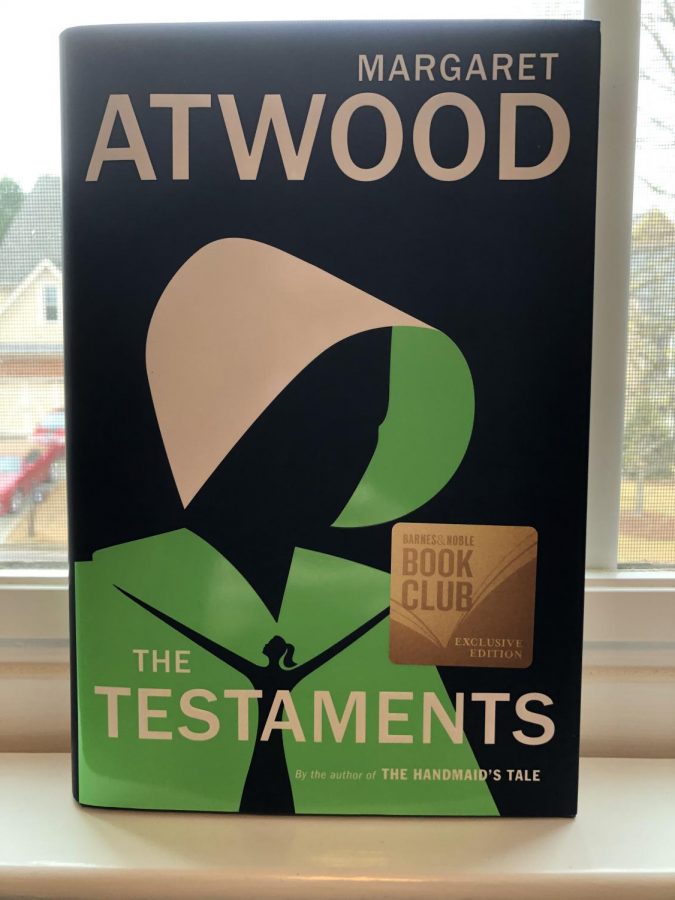Margaret Atwood brings new commentary about women’s rights in her novel, “The Testaments”
Reading time. The much anticipated sequel to “A Handmaid’s Tale” preaches equal rights. The sequel delves further into the lack of inequality that women have.
May 4, 2020
*Spoiler alert*
The follow-up novel to The Handmaid’s Tale, The Testaments, strikes the perfect balance between fiction and reality as Margaret Atwood compares the violently religious and controlling country of Gilead to the current state of America. Atwood carries the same attitude about feminism as she does in her first novel and campaigns for more women’s rights and self-control in her bold new take of Gilead.
The Testaments takes place after The Handmaid’s Tale in the totalitarian and theocratic country of Gilead where the government has subjugated the women and use them solely for reproductive purposes. Atwood adds three new perspectives to her story as opposed to her original narrator, Offred. Set fifteen years in the future, Atwood shows the regime of Gilead through the eyes of three narrators. Aunt Lydia–one of Gilead’s founder, Agnes–a young girl growing up in Gilead, and Daisy—a girl from Gilead who was smuggled into Canada as a baby and goes undercover to take down the totalitarian government. These new perspectives help to round out the world that Atwood crafted and provides more insight into what happened before and after Gilead.
Used from YouTube under fair use.
The Testaments provides a commentary on the current state of women’s rights in America and the world at large by further exploring the role of women in Gilead. Aunt Lydia, a Gilead founder, must show her undying loyalty to her country or be extinguished. The same rings true with the expectations of women today. Women must fulfill their societal roles as followers instead of leaders and show devotion to those who look down upon them. If women choose to defy men’s expectations, they are labeled as difficult and radical feminists. Even in a position of power like Aunt Lydia possesses, she was still under threat of death if she refused to support actions done by her superiors. Although a villainous character, reading from Aunt Lydia’s perspective was the most intriguing because the reader is finally able to see the inner workings and beginning of Gilead from a leader’s view. It helps to solve the mystery of the male-dominated government that seems all too real.
Another point of view that the book is written from is Agnes, a girl who was born and raised in Gilead. Agnes is one of the lucky children that did not have to become a Handmaid, but she did have to become a child bride to one of the Commanders, leaders of the household and Gilead. The only way out of her premature marriage is suicide or to become an Aunt where she will be stripped of her name and few freedoms. She chooses to become an Aunt rather than a child bride but many girls around the world do not have that option. Child marriage of girls under 18 is common in underdeveloped countries and in some more traditional and conservative American states. By including a form of child marriage in her book, Atwood is able to bring attention to the problem and shows how this is not a problem that only happens in a dystopia.
The third point of view is that of Daisy, a girl that lives in Canada. After her adoptive parents’ death, she is forced into the realization that she was born in Gilead and then smuggled across the Canadian border. Daisy discovers that she is the famous “Baby Nicole”–the child that Gilead has sought out for years after she was smuggled into freedom. Daisy’s perspective helps to contrast the normality of life outside of Gilead and put the horrors that Gilead has committed into perspective. Although reading from Daisy’s perspective was not the most entertaining, it was important to read about the world outside of Gilead.
The original novel, The Handmaid’s Tale, had a big impact on feminism and women’s rights in 1998. The Testaments continues that commentary with a modern twist that Atwood manages to effortlessly work into her story. With women’s rights being more endangered than ever, The Testaments weaves together a story of resistance and hope for women who feel lost and discouraged in this dangerous world.





